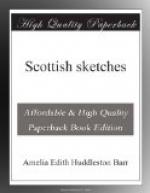“Up to the golden citadel they fare,
And as they go their limbs
grow full of might;
And One awaits them at the topmost stair,
One whom they had not seen,
but knew at sight.”
Andrew Cargill’s Confession.
ANDREW CARGILL’S CONFESSION.
CHAPTER I.
Between Sinverness and Creffel lies the valley of Glenmora. Sca Fells and Soutra Fells guard it on each hand, and the long, treacherous sweep of Solway Frith is its outlet. It is a region of hills and moors, inhabited by a people of singular gravity and simplicity of character, a pastoral people, who in its solemn high places have learned how to interpret the voices of winds and watersand to devoutly love their God.
Most of them are of the purest Saxon origin; but here and there one meets the massive features and the blue bonnet of the Lowland Scots, descendants of those stern Covenanters who from the coasts of Galloway and Dumfries sought refuge in the strength of these lonely hills. They are easily distinguished, and are very proud of their descent from this race whom
“God anointed with his odorous oil
To wrestle, not to reign.”
Thirty years ago their leader and elder was Andrew Cargill, a man of the same lineage as that famous Donald Cargill who was the Boanerges of the Covenant, and who suffered martyrdom for his faith at the town of Queensferry. Andrew never forgot this fact, and the stern, just, uncompromising spirit of the old Protester still lived in him. He was a man well-to-do in the world, and his comfortable stone house was one of the best known in the vale of Glenmora.
People who live amid grand scenery are not generally sensitive to it, but Andrew was. The adoring spirit in which he stood one autumn evening at his own door was a very common mood with him. He looked over the moors carpeted with golden brown, and the hills covered with sheep and cattle, at the towering crags, more like clouds at sunset than things of solid land, at the children among the heather picking bilberries, at the deep, clear, purple mist that filled the valley, not hindering the view, but giving everything a strangely solemn aspect, and his face relaxed into something very like a smile as he said, “It is the wark o’ my Father’s hand, and praised be his name.”
He stood at his own open door looking at these things, and inside his wife Mysie was laying the supper-board with haver bread and cheese and milk. A bright fire blazed on the wide hearth, and half a dozen sheep-dogs spread out their white breasts to the heat. Great settles of carved oak, bedded deep with fleeces of long wool, were on the sides of the fireplace, and from every wall racks of spotless deal, filled with crockery and pewter, reflected the shifting blaze.
Suddenly he stepped out and looked anxiously towards the horizon on all sides. “Mysie, woman,” said he, “there is a storm coming up from old Solway; I maun e’en gae and fauld the ewes wi’ their young lammies. Come awa’, Keeper and Sandy.”




